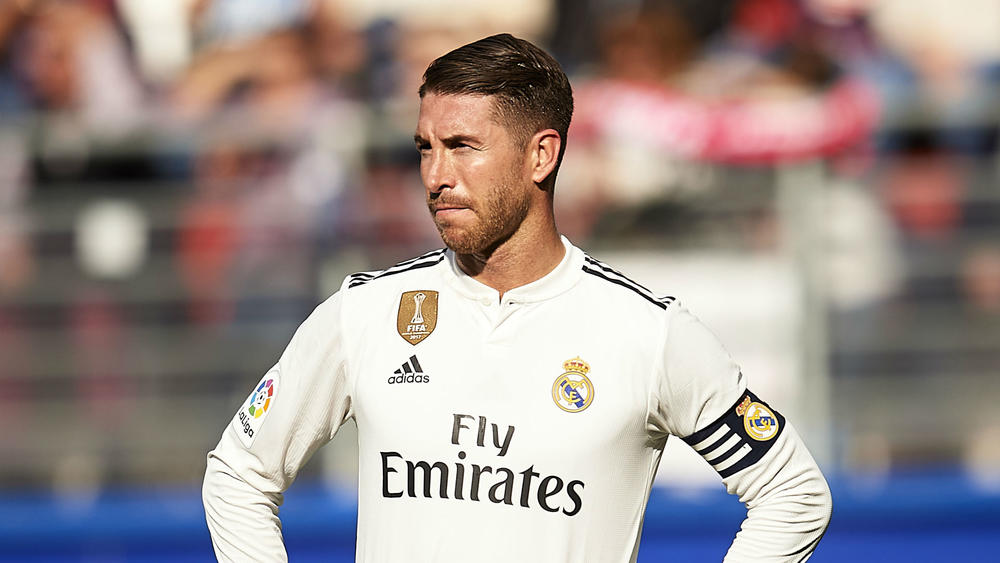Ramos slams doping claims as 'an attempt to stain my reputation'
Real Madrid and Spain captain Sergio Ramos has hit back at Football Leaks allegations that he broke anti-doping protocol on two occasions.

Sergio Ramos has vehemently denied allegations he committed anti-doping violations – the Real Madrid captain labelling Der Spiegel's reporting as "an attempt to stain my image and my professional reputation".
The German publication made a series of claims, as part of the Football Leaks investigation, which suggested Ramos had broken anti-doping protocol on two occasions.
The first related to an alleged post-match mix-up following the Champions League final against Juventus in 2017, in which Der Spiegel claim traces of a forbidden substance were found in Ramos' sample, while the second claim alleged the Spain defender knowingly broke anti-doping rules by showering prior to providing a sample after the LaLiga game against Malaga in April 2018.
Madrid issued a statement on Friday insisting, "Sergio Ramos has never breached anti-doping control regulations" and the player himself spoke to reporters after Saturday's stunning 3-0 loss at Eibar.
"That is a very difficult issue, complicated. I must come out and defend myself, with my legal team, against these allegations," he said.
"I have been through 250 or 300 doping tests over my career, and never failed one, there has never been any irregularity.”
"We know the type of publication this is. They threatened us with the news a month and a half ago. When you know the truth, you are not afraid of lies. It is an attempt to stain my image and my professional reputation."
Get FourFourTwo Newsletter
The best features, fun and footballing quizzes, straight to your inbox every week.
Shortly after giving those quotes in his post-match interview, Ramos issued a statement to comprehensively address the allegations.
Comunicado oficial | Official Announcement November 24, 2018
It read: "In relation to the information published about me across a number of different media outlets, I would like to clarify the following:
"I am vehemently opposed to doping. I have never participated, nor will I ever participate in, nor have I consented to, nor will I ever consent to any form of doping.
"The two specific cases referred to are explained as follow:
"1. Malaga, April 2018: When the match ended, I was requested to compete an anti-doping test. Given the time pressures on the team's return journey, the official allowed me to shower, remaining in his presence at all times, before completing the test which I passed, as in all cases.
"2. Cardiff, June 2017. I received a standard medical treatment administered by the club's medical professionals. The matter was clarified and resolved formally and in writing between the organisations."
Ramos added: "Over the course of my long sporting career I have submitted to, and passed satisfactorily, an infinite number of anti-doping tests. Neither in this case, as UEFA, WADA [the World Anti-Doping Agency] and Real Madrid have already stated, nor any other time in the past, have I breached anti-doping regulations.
"With respect to the right to information, I must also uphold my right to honour. My legal team will consider taking further action in those cases which misrepresent the truth and therefore undermine my reputation and violate my rights."
Der Spiegel's account of the Champions League final incident claims a Madrid doctor allegedly filled in a doping form incorrectly relating to a drug administered to Ramos before the game against Juve. Ramos was given dexamethasone to treat knee and shoulder injuries, but betamethasone was recorded on the form instead.
Both anti-inflammatory drugs are permitted under WADA rules but only if they are declared by doctors post match.
Der Spiegel also claim UEFA was aware of the mistake but was satisfied it was an administrative error and that no further action need be taken.
In a statement, European football's governing body "strongly and categorically refuted unfounded allegations it has covered up positive doping results".
In its own response to the reports, Spain's anti-doping agency AEPSAD said it "only proceeds to the opening of disciplinary proceedings when it has sufficient evidence of a possible anti-doping rule violation".
